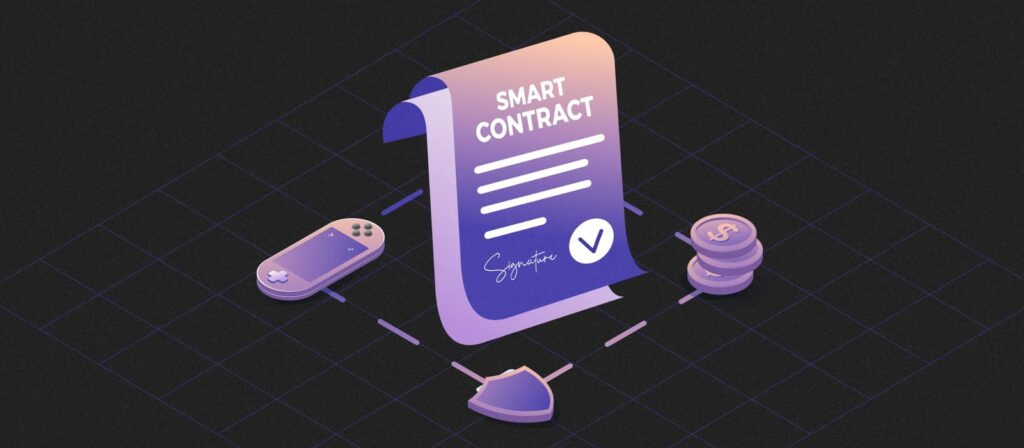Smart contracts are self-executing digital agreements stored on a blockchain. They automatically carry out instructions once specific conditions are met — without the need for banks, brokers, or any third party.
In simpler terms, it’s like a digital “kasunduan” that runs itself: transparent, tamper-proof, and fully automated. Whether you’re sending money, renting property, or investing in crypto — smart contracts do the work for you, with no middleman and no delays.
1. How Do Smart Contracts Work?
Smart contracts follow a basic logic: “If X happens, then do Y.”
Here’s how they typically work:
- An agreement is coded and deployed on a blockchain (like Ethereum or Solana).
- Specific conditions are set within the contract (e.g., “send payment”).
- Once conditions are met, the contract executes automatically (e.g., “release access”).
- Every action is recorded on the blockchain — permanent, secure, and visible to all.
No manual processing. No back-and-forth emails. No broken promises.
2. Why Smart Contracts Matter in the Philippines
The Philippines is one of the most active crypto markets in Southeast Asia, with millions of people participating in blockchain-based games, remittance tools, and digital investments. Smart contracts make these systems work — quietly powering automation behind the scenes.
3. Key Benefits for Filipino Users:
| Benefit | Description |
|---|---|
| Fast and automated | No waiting time; transactions execute instantly once triggered |
| Lower transaction costs | No banks or intermediaries to charge service fees |
| Transparent and verifiable | Actions are visible and trackable on public ledgers |
| Accessible and inclusive | Perfect for OFWs, freelancers, and unbanked users across the country |
| Foundational for Web3 | Enables DeFi, NFTs, GameFi, and other decentralized applications |
4. Real-Life Applications in the Philippines
Smart contracts are already shaping the way many Filipinos interact with money and digital platforms. Here are a few practical use cases:
- OFW Remittances: Sending funds without banks or delays using blockchain-based wallets and smart contracts.
- Play-to-Earn Gaming: Games like Axie Infinity use smart contracts to distribute rewards and manage digital assets.
- DeFi Lending & Borrowing: Access loans or earn interest on crypto without using traditional banks.
- NFT Ownership: Artists and creators receive automatic royalties every time their work is resold.
- Crowdfunding: Donations are only released if a target is reached — funds return if not.
5. Smart Contracts vs. Traditional Contracts
| Feature | Traditional Contracts | Smart Contracts |
|---|---|---|
| Execution | Manual, often delayed | Automatic, real-time |
| Transparency | Limited, often private | Public and auditable |
| Cost | High (lawyers, banks, notaries) | Low to zero transaction fees |
| Trust requirement | Relies on human agreement | Relies on code logic |
| Modifiability | Can be changed after signing | Immutable once deployed |
6. Popular Blockchains Supporting Smart Contracts
| Blockchain | Key Features |
|---|---|
| Ethereum | Largest ecosystem, widely supported, ideal for complex dApps |
| Solana | Fast and low-cost, gaining popularity in Southeast Asia |
| BNB Chain | Low fees and beginner-friendly |
| Polygon | Scalable and developer-friendly |
| Avalanche | Known for fast finality and eco-friendly architecture |
7. Frequently Asked Questions (FAQ)
1. Can smart contracts be hacked?
If a contract is poorly written, yes. But many smart contracts are audited for security. Users should choose reputable platforms.
2.Where can I use smart contracts in the Philippines?
You can use them on DeFi platforms, NFT marketplaces, crypto games, and wallets like MetaMask, Coins.ph, or Trust Wallet.
3. Do I need to know coding to use smart contracts?
No. Most users interact with smart contracts through apps and crypto wallets. The coding is handled by developers behind the scenes.
8. Conclusion: The Future Is Automated, Transparent, and Local
Smart contracts are not just for developers or big corporations — they’re for everyday Filipinos who want faster, cheaper, and more secure financial transactions. In a country with high mobile usage, large remittance flows, and growing digital adoption, the use of smart contracts can bring real benefits — from Metro Manila to Mindanao.
As the Philippines continues to explore blockchain regulation and innovation, smart contracts will be a foundational tool for anyone participating in Web3.


